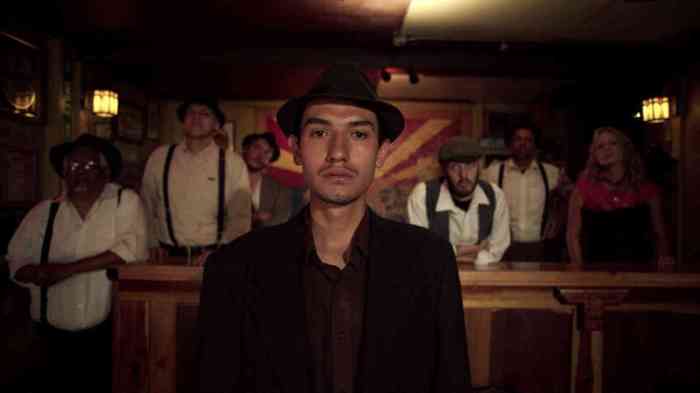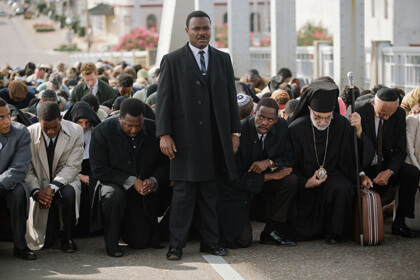Brandy Burre in “Actress,” Robert Greene’s documentary about her. | CINEMA GUILD
BY STEVE ERICKSON | Robert Greene’s past two documentaries, “Kati With an i” and “Fake It So Real,” were impressive, but they didn’t prepare one for the way he’s suddenly turned into an inventor of new forms. His latest film, “Actress,” has as much in common with Douglas Sirk as Frederick Wiseman. Greene picks up on the interest in performance evident in “Fake It So Real,” which followed a troupe of amateur wrestlers in North Carolina, and runs with it.
It’s become trendy to insert elements of fiction into documentary, but Greene does it in a way no one else has. He’s made a film about a middle-aged actress trying to salvage her career that falls squarely into a Hollywood tradition running from Billy Wilder’s “Sunset Boulevard” to David Lynch’s “Mulholland Drive.” Most of these films end tragically. The finale of “Actress” suggests that Greene is aware of that trope, but his protagonist, Brandy Burre, is struggling her hardest not to be a real-life example of it.
While appearing on “The Wire,” Brandy became pregnant with the first of her two children. She decided to retire from acting and move to suburban Beacon, New York with her partner Tim. For a few years, she was satisfied by life as a stay-at-home mom, supported by Tim’s restaurant business. Then she got bored and decided to head back to acting. But it seems impossible for her to find a balance between domestic life and that profession. Her relationship with Tim deteriorates, culminating in a sad Christmas break-up. She spends more time in New York, auditioning for roles. The break-up and her subsequent financial need lend a desperate edge to her quest to get back into show business.
Robert Greene lends creative invention to documentary about an actress trying to come back
“Actress” includes several scenes that stylize Brandy’s everyday life through slow motion, supersaturated colors (especially blaring reds and yellows), and cutting out live sound in favor of her voice-over or music. Ironically, these scenes don’t show anything particularly glamorous; in fact, they generally depict her doing household chores. There are far more dramatic scenes in “Actress,” shot in a matter-of-fact style. Greene demonstrates that the film is at least partially fiction by having Brandy repeat a line.
One could call the ultimate effect of these devices Brechtian, but they don’t distance the spectator from the film’s action. Even if “Actress” utilizes narrative contrivances, it’s just as gripping as a purely documentary approach.
However, Greene seems to want to make the spectator aware he’s telling a story, not documenting an unmediated reality. As directed by him, Brandy seems like a Rainer Werner Fassbinder character. Her life is falling apart around her, yet this paradoxically opens up new opportunities for her as an actress. She’s a gripping storyteller, but her final tale —which I won’t give away, since it closes the film — makes one wonder if she’s always telling the truth.
“Actress” comments on the sexism and ageism of the film industry. Brandy remarks that when she was in her late 20s, her onscreen romantic partners were about a decade older than she. Now that she’s just turned 40, she expects to get offered roles as “the wife or girlfriend.” All the same, more than institutional sexism, her own anxieties seem to be her worst enemy. In fact, the starkest example of sexism she offers up happened in Tim’s restaurant, not Hollywood. About a month after giving birth, she suggested that a diaper-changing board be installed in the women’s room, an idea scoffed at as ridiculous by the men who worked there.
When Greene began making “Actress,” he intended it as a portrait of a woman who happened to be his next-door neighbor. At the time he started shooting, he didn’t know just how troubled her relationship with Tim was. There are elements of desperation in “Fake It So Real,” but they’re mostly economic: the wrestlers profiled by Greene work crappy day jobs and most of them are aware that they’re never going to make it into the WWE.
“Actress” digs really hard into the drama of everyday life, finding plenty of material there. I suspect that whatever happens to Brandy down the road, this will be the film and performance for which she’ll always be remembered.
ACTRESS | Directed by Robert Greene | The Cinema Guild | Opens Nov. 7 | Elinor Bunin Munroe Film Center, Lincoln Center, 144 W. 65th St. | filmlinc.com



































